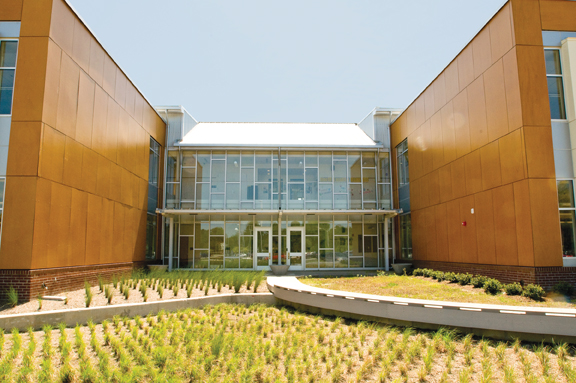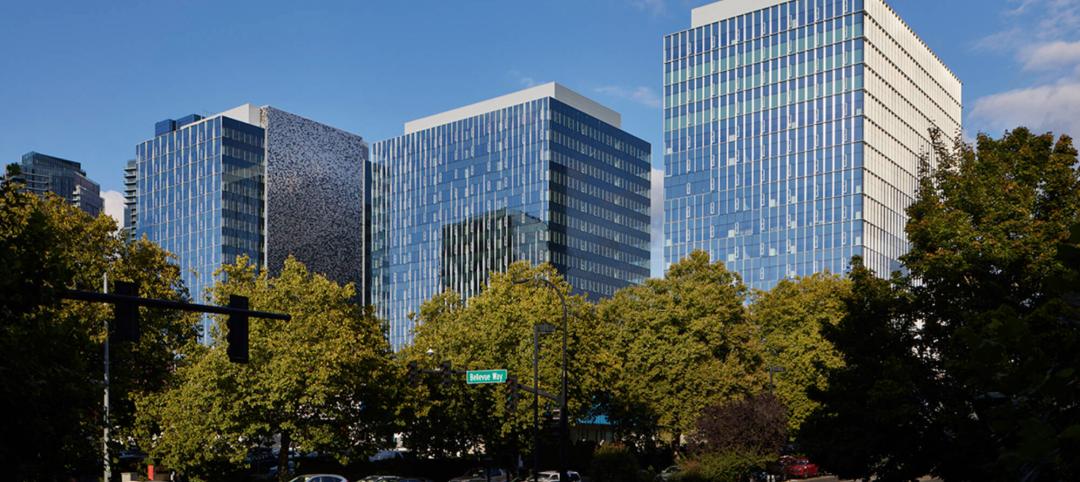From modular schools to a “test” classroom, green construction in the K-12 schools market has taken on many forms in the past decade. With school districts having to keep the needs of students in balance with limited budget flexibility, Building Teams around the country are finding ways to bring green schools into reality, whether by new construction or extensive renovation.
Chula Vista, Calif., charter school High Tech High was advised by San Diego-based general contractor BYCOR to turn to modular construction for its campus. Faced with a tight deadline and strict budget, the project also was working toward a variety of green goals, including LEED.
Modular manufacturer Williams Scotsman was brought on board to coordinate the integration of modular construction with the overall project; 59 modules totaling 32,807 sf were provided for the school, which was awarded LEED for Schools Gold certification.
In 2011 Dills Architects and McKenzie Construction completed the 94,231-sf College Park Elementary School in Virginia Beach, Va., with LEED Platinum certification in mind and net-zero stormwater management to boot. To meet the latter goal, the Building Team specified green vegetative roofing and cisterns for rainwater collection.
One Firm, multiple green certifications
Design firm SHW Group, Plano, Texas, draws from a variety of certification programs and rating systems to help build green.
The 105,000-sf Gloria Marshall Elementary School in Spring, Texas, was the first school in the Houston area to use geothermal heating and cooling. In addition to LEED Gold certification, the school received an Energy Star rating and was designed to meet Texas/CHPS (Collaborative for High Performance Schools) criteria.
The Fine Arts Facility at the 23,700-sf McCallum High School in Austin was the first educational facility in Texas to receive a five-star rating from the Austin Energy Green Building Program, the nation’s first comprehensive green building program. SHW saved the school district nearly $1 million by converting existing art rooms into science labs, building a new fine arts facility for theatre and art, and connecting the existing school with the fine arts facility.
The school also includes a “breathable” membrane that uses metal wall panels to keep moisture from getting trapped inside the wall. It is anticipated thait this will result in improved energy efficiency and indoor air quality for the school.
Green construction has also spread to the U.S. Military Academy Preparatory School at West Point, N.Y. The elite prep school moved to its new location after the former site in Fort Monmouth, N.J., was closed as part of the 2005 Base Realignment and Closure Act. The Building Team of STV (architect/engineer) and J. Kokolakis Contracting (GC) earned LEED Gold for the new facility. Environmentally conscious building practices included the procurement of materials with high recycled content, selling unused building materials to nearby manufacturers, and diverting 98.5% of C&D waste from landfill.
Many school districts, notably in California, are simultaneously implementing green building practices while using the buildings themselves to teach environmental principles to students. One such classroom, at the Davis Magnet School in Costa Mesa, was retrofitted with environmentally friendly flooring, furnishes, and paints, as well as high-performance lighting and a new ventilation system. A neighboring classroom was left unimproved.
The resulting experiment has students comparing the two classrooms to learn firsthand the benefits of sustainable educational environments. What’s more, the “greenovation,” according to Irvine-based architecture firm LPA Inc. and the Orange County chapter of the U.S. Green Building Council, came at zero cost to the school, having been funded through private donations. +
Related Stories
AEC Tech Innovation | Oct 8, 2024
New ABC technology report examines how AI can enhance efficiency, innovation
The latest annual technology report from Associated Builders and Contractors delves into how artificial intelligence can enhance efficiency and innovation in the construction sector. The report includes a resource guide, a case study, insight papers, and an essay concerning applied uses for AI planning, development, and execution.
Healthcare Facilities | Oct 8, 2024
Herzog & de Meuron completes Switzerland’s largest children’s hospital
The new University Children’s Hospital Zurich features 114 rooftop patient rooms designed like wooden cottages with their own roofs. The project also includes a research and teaching facility.
Mixed-Use | Oct 7, 2024
New mixed-use tower by Studio Gang completes first phase of San Francisco waterfront redevelopment
Construction was recently completed on Verde, a new mixed-use tower along the San Francisco waterfront, marking the end of the first phase of the Mission Rock development. Verde is the fourth and final building of phase one of the 28-acre project that will be constructed in several phases guided by design principles developed by a design cohort led by Studio Gang.
Brick and Masonry | Oct 7, 2024
A journey through masonry reclad litigation
This blog post by Walter P Moore's Mallory Buckley, RRO, PE, BECxP + CxA+BE, and Bob Hancock, MBA, JD, of Munsch Hardt Kopf & Harr PC, explains the importance of documentation, correspondence between parties, and supporting the claims for a Plaintiff-party, while facilitating continuous use of the facility, on construction litigation projects.
Glass and Glazing | Oct 7, 2024
Pattern language: An exploration of digital printing on architectural glazing
Architectural Glazing has long been an important expressive tool which, when selected and detailed thoughtfully, can contribute to the successful transformation of architectural concepts to reality.
University Buildings | Oct 4, 2024
Renovations are raising higher education campuses to modern standards
AEC higher ed Giants report working on a variety of building types, from performing arts centers and libraries to business schools. Hybrid learning is seemingly here to stay. And where possible, these projects address wellness and mental health concerns.
AEC Tech | Oct 3, 2024
4 ways AI impacts building design beyond dramatic imagery
Kristen Forward, Design Technology Futures Leader, NBBJ, shows four ways the firm is using AI to generate value for its clients.
Laboratories | Oct 2, 2024
Trends in scientific research environments: Q&A with Flad's Matt McCord
As part of an ongoing series, Matt McCord, AIA, NCARB, LEED AP BD+C, Associate Principal with Flad Architects, discusses the future of the scientific workplace.
Museums | Oct 1, 2024
UT Dallas opens Morphosis-designed Crow Museum of Asian Art
In Richardson, Tex., the University of Texas at Dallas has opened a second location for the Crow Museum of Asian Art—the first of multiple buildings that will be part of a 12-acre cultural district. When completed, the arts and performance complex, called the Edith and Peter O’Donnell Jr. Athenaeum, will include two museums, a performance hall and music building, a grand plaza, and a dedicated parking structure on the Richardson campus.
Data Centers | Oct 1, 2024
10 biggest impacts to the data center market in 2024–2025
While AI sends the data center market into the stratosphere, the sector’s accelerated growth remains impacted by speed-to-market demands, supply chain issues, and design innovation necessities.

















